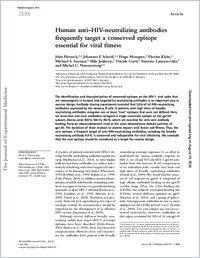Human anti–HIV-neutralizing antibodies frequently target a conserved epitope essential for viral fitness
- Pietzsch, John Laboratory of Molecular Immunology, The Rockefeller University, New York, NY 10065 - Institute of Chemistry and Biochemistry, Freie Universität Berlin, D-14195 Berlin, Germany
- Scheid, Johannes F. Laboratory of Molecular Immunology, The Rockefeller University, New York, NY 10065 - Charité Universitätsmedizin, D-10117 Berlin, Germany
- Mouquet, Hugo Laboratory of Molecular Immunology, The Rockefeller University, New York, NY 10065
- Klein, Florian Laboratory of Molecular Immunology, The Rockefeller University, New York, NY 10065
- Seaman, Michael S. Beth Israel Deaconess Medical Center, Boston, MA 02215
- Jankovic, Mila Laboratory of Molecular Immunology, The Rockefeller University, New York, NY 10065
- Corti, Davide Institute for Research in Biomedicine (IRB), Faculty of Biomedical Sciences, Università della Svizzera italiana, Switzerland
- Lanzavecchia, Antonio Institute for Research in Biomedicine (IRB), Faculty of Biomedical Sciences, Università della Svizzera italiana, Switzerland
- Nussenzweig, Michel C. Laboratory of Molecular Immunology, The Rockefeller University, New York, NY 10065 - Howard Hughes Medical Institute, The Rockefeller University, New York, NY 10065
-
02.08.2010
Published in:
- Journal of experimental medicine. - 2010, vol. 207, no. 9, p. 1995-2002
English
The identification and characterization of conserved epitopes on the HIV-1 viral spike that are immunogenic in humans and targeted by neutralizing antibodies is an important step in vaccine design. Antibody cloning experiments revealed that 32% of all HIV-neutralizing antibodies expressed by the memory B cells in patients with high titers of broadly neutralizing antibodies recognize one or more “core” epitopes that were not defined. Here, we show that anti-core antibodies recognize a single conserved epitope on the gp120 subunit. Amino acids D474, M475, R476, which are essential for anti-core antibody binding, form an immunodominant triad at the outer domain/inner domain junction of gp120. The mutation of these residues to alanine impairs viral fusion and fitness. Thus, the core epitope, a frequent target of anti–HIV-neutralizing antibodies, including the broadly neutralizing antibody HJ16, is conserved and indispensible for viral infectivity. We conclude that the core epitope should be considered as a target for vaccine design.
- Language
-
- English
- Classification
- Medicine
- License
- Open access status
- hybrid
- Identifiers
-
- RERO DOC 324229
- DOI 10.1084/jem.20101176
- ARK ark:/12658/srd1319007
- Persistent URL
- https://n2t.net/ark:/12658/srd1319007
Statistics
Document views: 165
File downloads:
- Texte intégral: 239
